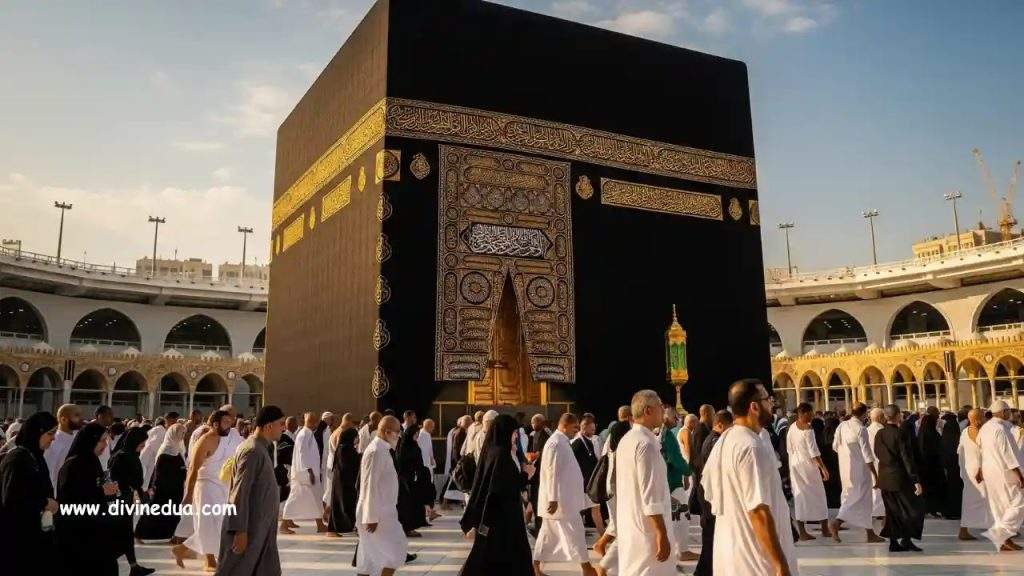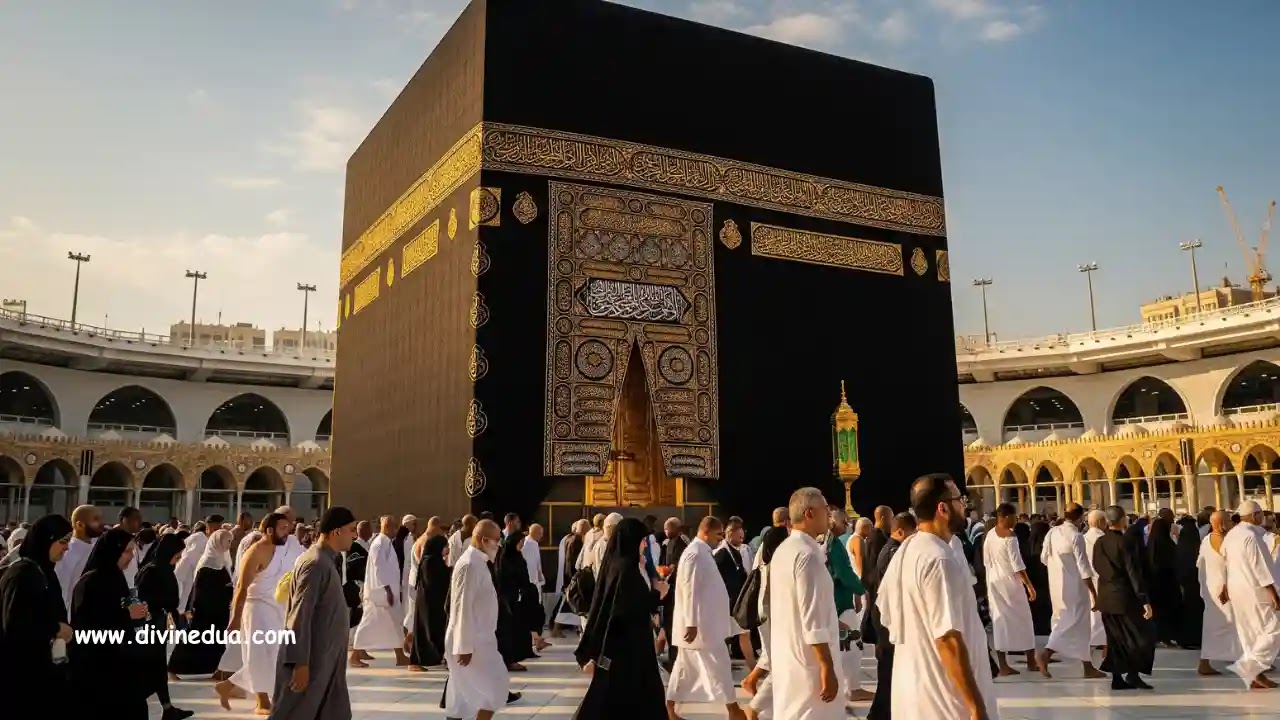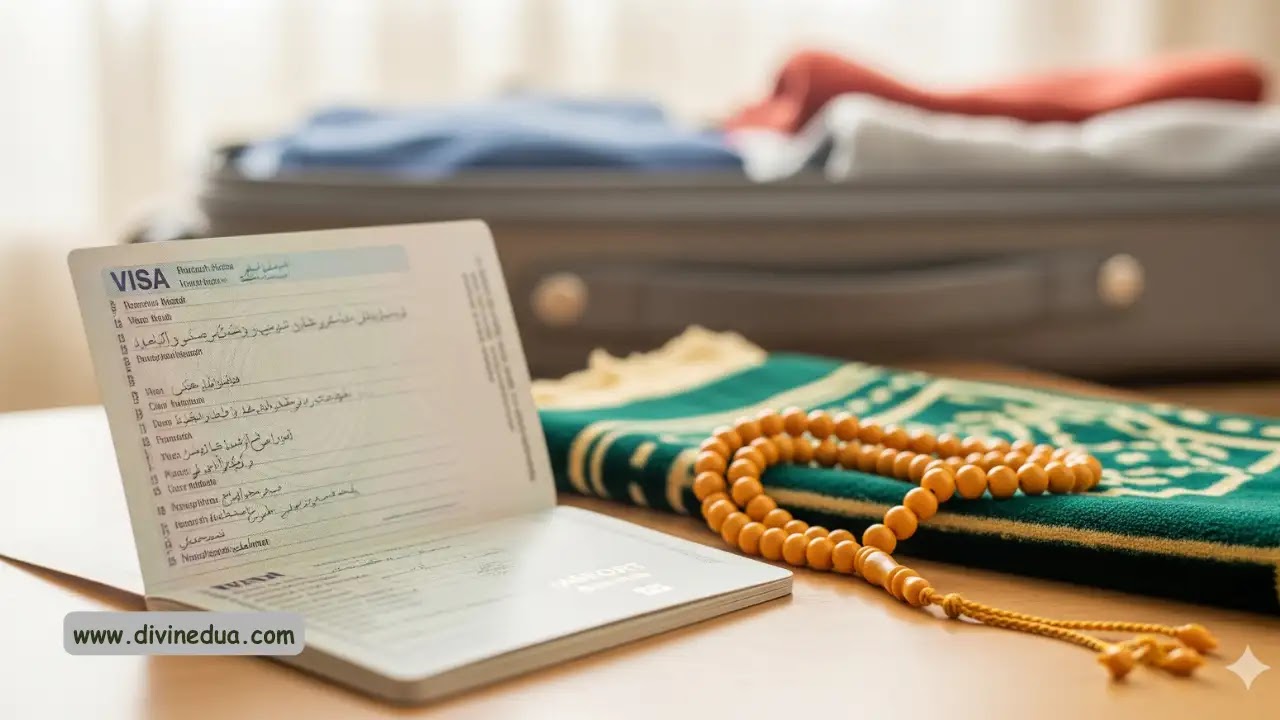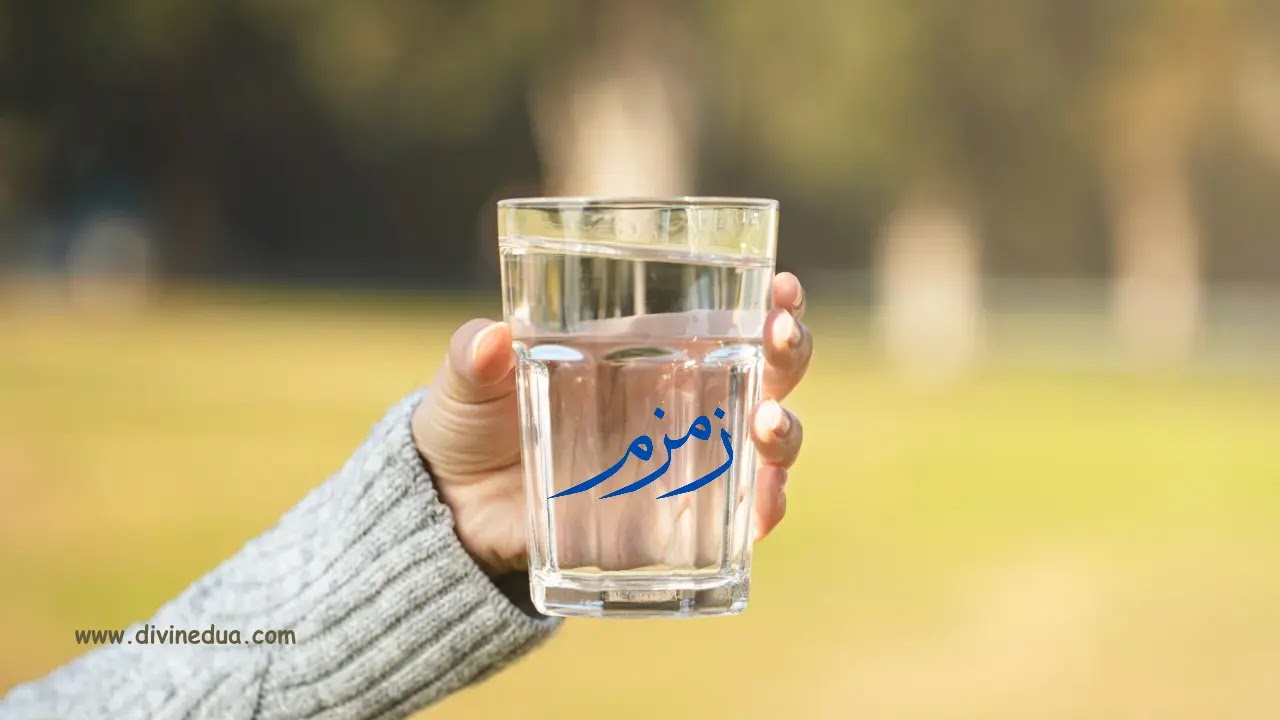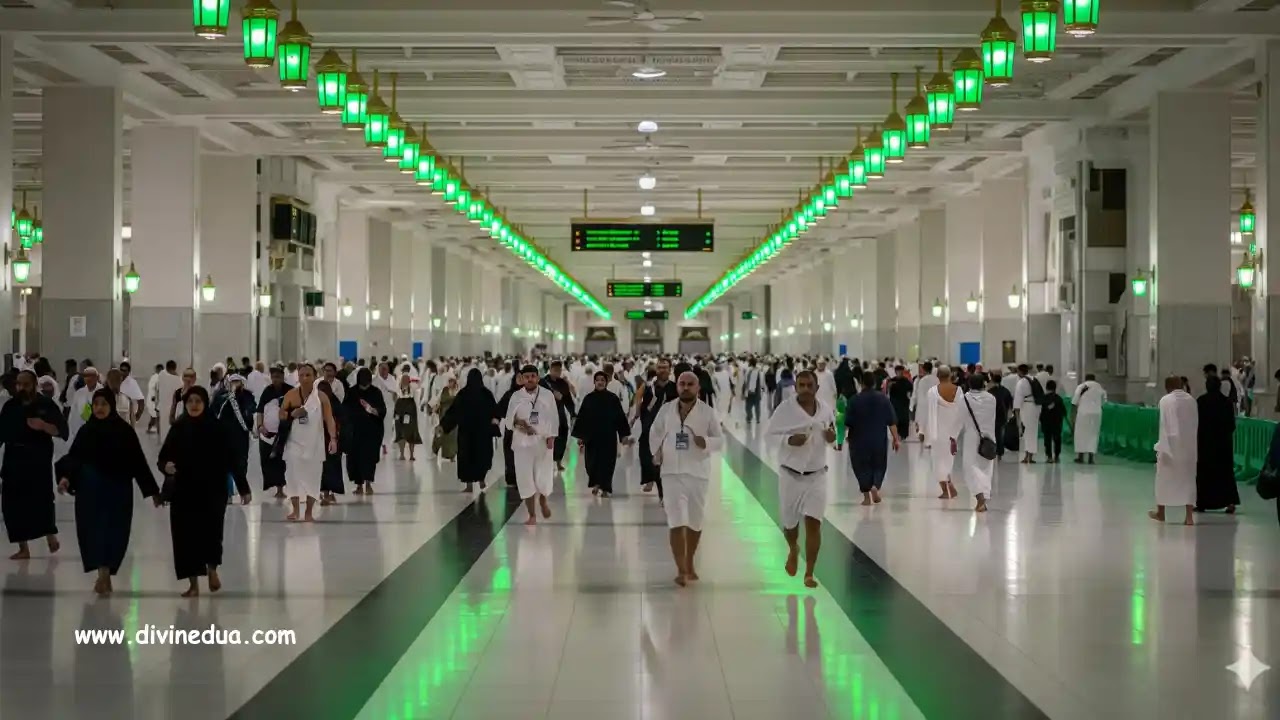The Ultimate Guide to Umrah Duas: A Step-by-Step Pilgrim’s Companion
There is a journey that the soul yearns for long before the feet begin to walk. It is a call that echoes in the deepest parts of the heart, a longing to stand before the House of Allah, humbled and hopeful.
The Umrah is not merely a physical trip; it is the heart’s pilgrimage, a profound spiritual reset where every step, every word, and every tear is a conversation with your Creator.
But in the midst of overwhelming emotions, it’s easy to feel lost for words. What should you say? How do you capture the feelings of awe, repentance, and gratitude that flood your soul?
This guide was created for that very reason. It is not a simple list of instructions; it is designed to be your spiritual companion on this blessed journey. Inside, you will find the prophetic duas that accompany you from intention to completion, along with tips to connect with these words and turn them into a heartfelt dialogue with Allah.
Let this be your guide as you answer the call, “Labbayk Allahumma Labbayk.”
To truly understand the transformative power of this pilgrimage, you can explore the deep spiritual and psychological benefits of performing Umrah.
Before You Leave: Duas for Preparation and Travel
Your Umrah begins not at the Miqat, but in your heart, the moment you make the sincere intention to perform it. These supplications will safeguard your journey from the very first step you take outside your home.
1. The Dua of Intention (Niyyah)
The Niyyah is the spiritual cornerstone of your Umrah. It is the sincere intention in your heart to perform the pilgrimage for the sake of Allah alone. While the intention is in the heart, it is a Sunnah to utter it with your tongue when you reach the designated Miqat point.
لَبَّيْكَ اللَّهُمَّ عُمْرَةً
Transliteration: “Labbayka Allahumma ‘Umrah.”
Translation: “O Allah, I answer Your call to perform Umrah.”
How to Feel This Dua: A Tip for Your Heart and Soul
When you say these words, pause and feel their weight. “Labbayk” is not just a word; it is a profound declaration of surrender. Imagine you are saying, “Here I am, O Allah, leaving behind my world, my status, and my ego, responding to Your personal invitation. I come as a guest to Your House, vulnerable and hopeful, seeking nothing but Your pleasure.” This is the moment you officially become a pilgrim, so let your heart be fully present in this declaration.
2. The Dua for Leaving the Home
As you step out of your door to begin this blessed journey, you place your trust entirely in Allah to protect your home and your family, and to guide your path.
بِسْمِ اللهِ، تَوَكَّلْتُ عَلَى اللهِ، وَلَا حَوْلَ وَلَا قُوَّةَ إِلَّا بِاللهِ
Transliteration: “Bismillahi, tawakkaltu ‘alallahi, wa la hawla wa la quwwata illa billah.”
Translation: “In the name of Allah, I have placed my trust in Allah, and there is no might nor power except with Allah.”
3. The Dua for Travel
This comprehensive supplication is your shield for the entire journey, whether by car, plane, or bus. It is a plea for safety, ease, and a righteous purpose.
اللهُ أَكْبَرُ، اللهُ أَكْبَرُ، اللهُ أَكْبَرُ، سُبْحَانَ الَّذِي سَخَّرَ لَنَا هَذَا وَمَا كُنَّا لَهُ مُقْرِنِينَ، وَإِنَّا إِلَى رَبِّنَا لَمُنْقَلِبُونَ
Transliteration: “Allahu Akbar, Allahu Akbar, Allahu Akbar. Subhanalladhi sakh-khara lana hadha wa ma kunna lahu muqrinin. Wa inna ila Rabbina lamunqalibun.”
Translation: “Allah is the Greatest, Allah is the Greatest, Allah is the Greatest. Glory is to Him Who has provided this for us though we could never have had it by our efforts. And verily, to Our Lord we are to return.”
(Source: Sahih Muslim)
The Sacred Arrival: Duas for Entering Mecca and Al-Masjid Al-Haram
As you approach the holiest city on Earth, the feelings of anticipation and awe begin to build. Every step brings you closer to the House of Allah. These supplications mark your blessed entry into this sacred sanctuary.
1. Dua for Entering Mecca
Upon entering the boundaries of the blessed city of Mecca, it is recommended to recite this dua, asking Allah for a blessed and peaceful stay.
اللَّهُمَّ هَذَا حَرَمُكَ وَأَمْنُكَ، فَحَرِّمْ لَحْمِي وَدَمِي وَشَعْرِي وَبَشَرِي عَلَى النَّارِ، وَآمِنِّي مِنْ عَذَابِكَ يَوْمَ تَبْعَثُ عِبَادَكَ، وَاجْعَلْنِي مِنْ أَوْلِيَائِكَ وَأَهْلِ طَاعَتِكَ
Transliteration: “Allahumma hadha haramuka wa amnuka, faharrim lahmi wa dami wa sha’ri wa bashari ‘alan-nar. Wa aminni min ‘adhabika yawma tab’athu ‘ibadak, waj’alni min awliya’ika wa ahli ta’atik.”
Translation: “O Allah, this is Your sanctuary and Your security. So, make my flesh, my blood, my hair, and my skin forbidden for the Hellfire. And grant me security from Your punishment on the day You resurrect Your servants, and make me one of Your allies and obedient worshippers.”
(Source: Fiqh-us-Sunnah)
2. Dua for Entering Al-Masjid Al-Haram
When you arrive at the Grand Mosque, pause at the entrance, step in with your right foot, and recite the same dua recommended for entering any mosque, but with an elevated sense of reverence.
بِسْمِ اللهِ، وَالصَّلَاةُ وَالسَّلَامُ عَلَى رَسُولِ اللهِ، اللَّهُمَّ افْتَحْ لِي أَبْوَابَ رَحْمَتِكَ
Transliteration: “Bismillahi, was-salatu was-salamu ‘ala Rasulillah. Allahummaftah li abwaba rahmatik.”
Translation: “In the name of Allah, and peace and blessings be upon the Messenger of Allah. O Allah, open for me the gates of Your mercy.”
3. Dua Upon First Seeing the Kaaba
This is one of the most powerful and emotional moments of the entire journey. As your eyes fall upon the magnificent Kaaba for the first time, your heart will be overwhelmed. This is a special time when duas are readily accepted, so raise your hands and pour out your heart.
اللَّهُمَّ زِدْ هَذَا الْبَيْتَ تَشْرِيفًا وَتَعْظِيمًا وَتَكْرِيمًا وَمَهَابَةً، وَزِدْ مَنْ شَرَّفَهُ وَكَرَّمَهُ مِمَّنْ حَجَّهُ أَوِ اعْتَمَرَهُ تَشْرِيفًا وَتَكْرِيمًا وَتَعْظِيمًا وَبِرًّا
Transliteration: “Allahumma zid hadhal-bayta tashrifan wa ta’dhiman wa takriman wa mahabah. Wa zid man sharrafahu wa karramahu mimman hajjahu awi’tamarahu tashrifan wa takriman wa ta’dhiman wa birra.”
Translation: “O Allah, increase this House in honor, and veneration, and respect, and reverence. And increase those who honor and respect it—of those who perform Hajj or ‘Umrah—in honor, and respect, and veneration, and righteousness.”
How to Feel This Dua: A Tip for Your Heart and Soul
In this moment, words may fail you, and that is perfectly okay. Before you even try to recite the dua, just look. Let your eyes absorb the sight that millions of Muslims around the world pray towards every single day. Allow the tears to flow freely, as they are a language the heart speaks when the tongue cannot. Feel yourself as a guest who has finally arrived at the home of the King. Your first dua here is not just a recitation; it is the soul’s first, breathtaking conversation with the Lord of the House. Feel the history, the magnitude, and the immense mercy that envelops this sacred space.
The Heart of Umrah: Duas for Tawaf (The 7 Rounds)
Tawaf is the profound act of circling the Kaaba seven times, a beautiful physical representation of a believer’s life revolving around Allah. This sacred ritual begins and ends at the Black Stone (Al-Hajar al-Aswad), a stone with an immense history and spiritual significance.
While there are no specific duas that are mandatory for each round, many pilgrims find comfort in reciting certain supplications. The following table offers suggestions for each round, but remember, the most powerful dua is the one that comes from your heart.
| Round | Suggested Dua or Action |
|---|---|
| Round 1 | Focus on glorifying Allah and declaring His Oneness. A good start is “SubhanAllah, walhamdulillah, wa la ilaha illallah, wallahu akbar.” |
| Round 2 | Seek forgiveness for yourself. You can recite Sayyid al-Istighfar or simply repeat “Astaghfirullah.” |
| Round 3 | Make dua for your parents, family, and loved ones, both living and deceased. |
| Round 4 | Ask for the best of this world: health, provision (rizq), righteous children, and beneficial knowledge. |
| Round 5 | Ask for the best of the Hereafter: an easy reckoning, protection from the Hellfire, and entry into Jannah al-Firdaws. |
| Round 6 | Make dua for the entire Muslim Ummah, for the oppressed, the sick, and for guidance for all. |
| Round 7 | Entrust your future to Allah. Ask Him to keep you steadfast on His path and to grant you a good end to your life. |
The Most Repeated Dua in Tawaf
Between the Yemeni Corner (Ar-Rukn al-Yamani) and the Black Stone, it is a beloved Sunnah to continuously recite the following comprehensive dua:
رَبَّنَا آتِنَا فِي الدُّنْيَا حَسَنَةً وَفِي الْآخِرَةِ حَسَنَةً وَقِنَا عَذَابَ النَّارِ
Transliteration: “Rabbana atina fid-dunya hasanatan wa fil-akhirati hasanatan wa qina ‘adhaban-nar.”
Translation: “Our Lord, give us in this world [that which is] good and in the Hereafter [that which is] good and protect us from the punishment of the Fire.”
After Completing the Tawaf
Once you have completed the seven rounds, you will pray two rak’ahs behind Maqam Ibrahim (the Station of Abraham). After the prayer, it is a recommended time to make dua.
Following this, you proceed to drink from the blessed water of Zamzam. When drinking, face the Kaaba and make this supplication:
اللَّهُمَّ إِنِّي أَسْأَلُكَ عِلْمًا نَافِعًا، وَرِزْقًا وَاسِعًا، وَشِفَاءً مِنْ كُلِّ دَاءٍ
Transliteration: “Allahumma inni as’aluka ‘ilman nafi’an, wa rizqan wasi’an, wa shifa’an min kulli da’.”
Translation: “O Allah, I ask You for beneficial knowledge, abundant provision, and a cure from every disease.”
Walking in History’s Footsteps: Duas for Sa’i
The Sa’i, the act of walking and jogging between the two small hills of Safa and Marwah, is more than just a ritual. It is a powerful commemoration of a mother’s desperate search for water for her infant son, Ismail. As you walk these steps, you are re-enacting the unwavering faith and perseverance of Hajar (AS).
Her desperate search was answered with the miraculous gift of Zamzam. In every step you take, you are reminded that Allah always responds to a desperate and sincere heart.
1. Dua upon Reaching Safa and Marwah
As you begin the Sa’i, you will first ascend the hill of Safa. Upon reaching it, face the Kaaba, raise your hands, and recite the following:
إِنَّ الصَّفَا وَالْمَرْوَةَ مِن شَعَائِرِ اللَّهِ
Transliteration: “Innas-safa wal-marwata min sha’a’irillah.”
Translation: “Indeed, Safa and Marwah are among the symbols of Allah.” (Quran 2:158)
أَبْدَأُ بِمَا بَدَأَ اللهُ بِهِ
Transliteration: “Abdau bima bada’allahu bih.”
Translation: “I begin with what Allah began with.”
After this, you can make Takbir (Allahu Akbar) three times and make any personal supplications you wish. You will repeat this when you ascend Marwah on each of the seven laps.
2. Dua While Performing Sa’i
While walking between the two hills, there is no single mandatory dua. You are encouraged to glorify Allah, seek His forgiveness, and make personal duas. However, a commonly recited supplication is:
رَبِّ اغْفِرْ وَارْحَمْ، إِنَّكَ أَنْتَ الْأَعَزُّ الْأَكْرَمُ
Transliteration: “Rabbighfir warham, innaka antal-a’azzul-akram.”
Translation: “O my Lord, forgive and have mercy. Indeed, You are the Most Mighty, the Most Generous.”
Between the green lights, which mark the area where Hajar is believed to have run, it is a Sunnah for men to jog or run, while women should continue walking at a brisk pace.
The Final Rites: Duas for Completing Your Umrah
After completing the Sa’i, you have arrived at the final step of your Umrah. To exit the state of Ihram, men are required to shave their heads (Halq) or trim their hair (Taqsir), with shaving being the superior option. Women are only required to trim a small portion of their hair.
This act symbolizes a fresh start, a shedding of past sins, and a spiritual rebirth. Upon completing this rite, all the restrictions of Ihram are lifted, and your Umrah is complete.
Dua After Cutting the Hair
After the hair has been cut, it is a good practice to face the Qibla and make a final dua, thanking Allah for allowing you to complete the rites and asking for His acceptance.
الْحَمْدُ لِلَّهِ الَّذِي قَضَى عَنَّا نُسُكَنَا، اللَّهُمَّ زِدْنَا إِيمَانًا وَيَقِينًا وَعَوْنًا
Transliteration: “Alhamdullilahi-lladhi qada ‘anna nusukana. Allahumma zidna imanan wa yaqinan wa ‘awna.”
Translation: “All praise is for Allah who helped us complete our rites. O Allah, increase us in faith, certainty, and assistance.”
Practical Tips and Common Mistakes to Avoid
Your Umrah is a deeply personal journey, and focusing on your connection with Allah is more important than anything else. Here are a few tips to help you get the most out of your experience and avoid some common misunderstandings.
Practical Tips for a Smoother Experience
- Focus on Quality, Not Quantity: It is better to make one heartfelt dua that you understand than to rush through a long list of supplications you don’t connect with.
- Don’t Stress About Reading from a Book: In the peak of Tawaf, the crowds can be intense. Trying to read from a book or phone can be distracting and even dangerous. Memorize short, powerful duas (like “Rabbana atina…”) and repeat them with sincerity.
- Utilize Your Own Language: Allah understands all languages. After reciting the prophetic duas in Arabic, feel free to pour your heart out in your own language. It often leads to a deeper, more personal connection.
- Leverage Technology Wisely: For managing your pilgrimage logistics, such as booking prayer times in the Rawdah, using an official tool like the Nusuk app is essential for a modern pilgrim.
Common Mistakes to Avoid
- Thinking Duas for Each Round are Obligatory: There are no specific, mandatory duas for each of the seven rounds of Tawaf or Sa’i. The suggestions in this guide are just that—suggestions. The most important thing is to keep your tongue moist with the remembrance of Allah.
- Shouting Duas in Unison: While it can feel powerful to be part of a group, your conversation with Allah should be personal and humble. Avoid shouting or disturbing others who are trying to concentrate on their own supplications.
- Touching and Wiping Everything: The only things it is a Sunnah to touch are the Black Stone and the Yemeni Corner. Wiping every wall and pillar of the Kaaba is not part of the ritual and can distract from the purpose of Tawaf.
Bonus Supplication Spots
There are a few places where duas are known to be especially accepted. If you get the chance, seek out these spots:
- The Multazam: This is the area between the Black Stone and the door of the Kaaba. It is a place of immense spiritual power where pilgrims cling to the wall and make emotional duas.
- Inside the Hijr Ismail: This semi-circular area next to the Kaaba is considered part of the Kaaba itself. Praying inside it is like praying inside the Kaaba.
Your Free Gift: A Printable Umrah Dua Checklist (PDF)
To make your journey smoother and help you focus on your connection with Allah, we have prepared a special gift for you. This is a beautifully designed, printable PDF checklist containing all the essential duas mentioned in this guide, organized step-by-step.
Instead of struggling with your phone in the crowds, you can simply print this guide, fold it, and keep it with you as your personal spiritual companion.
[UNAVAILABLE, WILL RETURN SOON INSHAALAH]
Frequently Asked Questions about Umrah Duas
Q1: Are there specific duas required for each round of Tawaf?
No, this is a common misconception. There are no mandatory duas for each of the seven rounds. The most important thing is to remain in a state of remembrance. The only specific sunnah is to recite “Rabbana atina fid-dunya…” between the Yemeni Corner and the Black Stone.
Q2: Can I make dua in my own language?
Yes, absolutely. While reciting the prophetic duas in Arabic is best, Allah understands all languages. After reciting the known Arabic duas, it is highly encouraged to speak to Allah from your heart in the language you are most comfortable with.
Q3: What should I do if I forget a specific dua?
Do not worry or stress. If you forget a specific supplication, you can simply glorify Allah by saying “SubhanAllah,” “Alhamdulillah,” “Allahu Akbar,” or send blessings upon the Prophet (ﷺ). The goal is continuous remembrance, not just recitation from memory.
Q4: How can I memorize the Umrah duas quickly?
The best method is to start a few weeks before your trip. Focus on one or two duas each day. Listen to audio recordings to get the pronunciation right, write them down on flashcards, and try to recite them during your daily prayers to build a habit.
Q5: Is it okay to read duas from a phone during Tawaf?
While it is permissible, it is often not practical and can be distracting. The crowds can make it difficult to hold and read from a phone, which might take you out of the spiritual moment. It’s better to memorize short duas or use our free printable PDF guide.
Q6: What are the signs of an accepted Umrah (Umrah Maqbula)?
The greatest sign, as mentioned by scholars, is returning from the Umrah with a positive change in your life. This includes having a softer heart, a stronger desire to perform good deeds, and a firm intention to stay away from sins you previously committed.
Conclusion: The Journey Continues in Your Heart
Your Umrah may conclude, but the spiritual connection you have forged is just beginning. This journey is a profound gift from Allah, an opportunity to reset your soul, cleanse your past, and draw closer to Him in a way that words can hardly describe.
While Umrah is performed in Mecca, the journey is often paired with a visit to Madinah to pray in the Prophet’s Mosque and experience its profound tranquility.
The duas you have learned are more than just words; they are the tools to keep that connection alive. Carry them with you, not just on your tongue, but in your heart. Let them be a source of comfort, guidance, and strength in your daily life.
Pray with the certainty of a heart that knows it is speaking to the Most Merciful. Trust that every tear you shed and every sincere word you uttered has been heard.
We encourage you to bookmark this guide, share it with friends and family who are planning their own pilgrimage, and most importantly, keep the spirit of your Umrah alive until you are blessed to return once more.
May Allah accept your Umrah, forgive your sins, and bring you back to His House again and again. Ameen.

